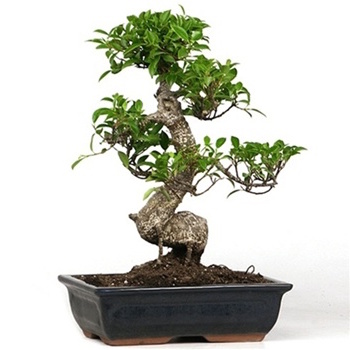I’ve always had a green thumb and a deep love for bonsai trees, so when I noticed that my beautiful bonsai ficus was dropping leaves, I immediately went into panic mode. I knew something must be wrong, but I couldn’t quite figure out the reason behind this leafy dilemma.
After doing some research and consulting with fellow bonsai enthusiasts, I discovered that there are several common reasons why bonsai ficus trees may shed their leaves. From improper watering and insufficient light to pests and diseases, it appears that my little ficus was facing a multitude of potential issues. In this article, I will delve into these common reasons, providing you with a comprehensive understanding of why your bonsai ficus may be dropping its leaves and how to address these issues with expert tips and advice.
So, if you’re as passionate about bonsai trees as I am, keep reading to discover the secrets of nurturing your bonsai ficus back to its vibrant, leafy glory.
Common Reasons for Bonsai Ficus Dropping Leaves
If you’re a bonsai enthusiast, you may have encountered a frustrating situation where your beautiful ficus bonsai starts dropping leaves. It can be disheartening to see your tree losing its foliage, but fear not, as this article will explore the common reasons behind this issue and provide some helpful solutions.
Insufficient Light
One possible reason for your bonsai ficus dropping leaves could be insufficient light. Ficus trees thrive in bright, indirect sunlight. If your bonsai is placed in a location with low light levels, it may not receive the necessary energy for photosynthesis. As a result, the tree may shed its leaves to conserve moisture and resources.
To solve this issue, you can consider moving your bonsai to a spot that receives more natural light. However, direct sunlight can be too intense for ficus trees, so it’s important to strike a balance. Place your bonsai near a window or provide artificial grow lights to ensure it gets adequate illumination.
Overwatering
Overwatering is a common mistake made by bonsai enthusiasts, and it can cause your ficus bonsai to drop its leaves. When the roots of a bonsai ficus are constantly soaked in water, it can lead to root rot, depriving the tree of necessary oxygen and nutrients. As a result, the tree may shed its leaves as a survival mechanism.
To address overwatering, it’s crucial to establish a proper watering routine. Allow the soil to partially dry out between waterings and make sure the pot has drainage holes to prevent water from accumulating. Additionally, consider using a well-draining bonsai soil mix to promote proper airflow and prevent excessive moisture retention.

Underwatering
On the other hand, underwatering can also cause your bonsai ficus to drop leaves. If the soil becomes too dry, the tree may not receive enough water to sustain its foliage and vital functions. In response, it may shed leaves to conserve moisture and energy.
To combat underwatering, make sure to regularly check the moisture level of the soil. Water your bonsai when the top inch or so of the soil feels dry to the touch. Be mindful not to let the soil become bone dry, as this can also stress the tree. Proper hydration is essential for maintaining the health of your bonsai ficus.
Temperature Stress
Temperature stress can be another factor contributing to leaf drop in bonsai ficus trees. These trees prefer a moderate climate with temperatures ranging between 60-75°F (15-24°C). Drastic fluctuations or extremes in temperature can cause stress, leading to leaf loss.
If your bonsai ficus is regularly exposed to high or low temperatures, consider relocating it to a more suitable environment. Protect the tree from drafty areas, air conditioning vents, or radiators that can create temperature imbalances. Maintaining a stable and moderate temperature will help prevent leaf drop.

Pests and Diseases
Pests and diseases can wreak havoc on the health of your bonsai ficus and cause it to drop leaves. Common pests that affect ficus trees include aphids, spider mites, and scale insects. These pests suck sap from the leaves, weakening the tree and leading to leaf drop. Fungal or bacterial infections can also cause similar symptoms.
To tackle pest infestations, regularly inspect your bonsai for any signs of insects or disease. If you notice any pests, isolate the affected tree and treat it with an appropriate insecticide or horticultural oil. Additionally, maintaining good bonsai hygiene by removing dead leaves and debris can help prevent pests and diseases.
Nutrient Deficiency
Leaf drop in bonsai ficus can occur due to nutrient deficiencies. Ficus trees require specific nutrients, such as nitrogen, phosphorus, and potassium, to thrive. Insufficient levels of these nutrients can lead to weakened foliage and eventual leaf drop.
To ensure your bonsai ficus receives adequate nutrition, use a balanced fertilizer formulated specifically for bonsai plants. Follow the recommended dosage instructions and fertilize regularly during the growing season. This will help provide the necessary nutrients for healthy leaf development and overall tree vitality.

Root Issues
Root issues, such as root bound or circling roots, can also cause leaf drop in bonsai ficus. When the roots become cramped or entangled, they may struggle to absorb water and nutrients effectively. This can lead to stress and leaf loss.
If you suspect root issues, carefully remove the bonsai ficus from its pot and examine the roots. If you notice a tangled mass of roots, lightly prune them to encourage healthy growth. Consider repotting the bonsai into a larger container to provide ample room for root expansion. Be sure to use a suitable bonsai soil mix to promote proper drainage and root health.
Transplant Shock
Transplant shock can occur when a bonsai ficus is moved or repotted. It can cause stress to the tree, resulting in leaf drop. Transplant shock is more likely to happen if the tree is not properly acclimated or if root damage occurs during the process.
To minimize transplant shock, carefully plan and execute the transplanting process. Choose an appropriate time, such as early spring, when the tree is actively growing. Take care to handle the roots gently and avoid damage. After repotting, provide the bonsai ficus with proper care and monitoring to help it recover and adjust to its new environment.

Seasonal Changes
Leaf drop can be a natural response to seasonal changes in bonsai ficus trees. During the winter months, ficus trees may enter a period of dormancy where they shed their leaves as part of their natural cycle.
If you notice leaf drop during winter, it is likely a normal occurrence. However, it’s always important to monitor the tree’s overall health and ensure it receives appropriate care during this period. Avoid overwatering and provide sufficient light to help support the tree’s dormancy phase.
Stress or Environmental Factors
Lastly, bonsai ficus can drop leaves in response to stress or other environmental factors. Changes in humidity, air quality, or sudden disturbances can cause your tree to react by shedding foliage. Additionally, the introduction of new pets or construction activities near your bonsai can also cause stress and leaf drop.
To minimize stress-related leaf drop, create a stable and nurturing environment for your bonsai ficus. Maintain consistent humidity levels by placing a humidity tray or using a humidifier. Ensure good airflow and air quality around the tree. By reducing external stressors, you can help your bonsai ficus maintain its leaves and overall health.
In conclusion, there are several common reasons for bonsai ficus trees dropping leaves. By addressing issues such as insufficient light, overwatering, underwatering, temperature stress, pests and diseases, nutrient deficiency, root problems, transplant shock, seasonal changes, and environmental factors, you can help your tree regain its vibrancy and health. Remember to provide proper care, monitor closely, and make necessary adjustments to ensure your bonsai ficus thrives and continues to grace your living space with its beautiful foliage.



